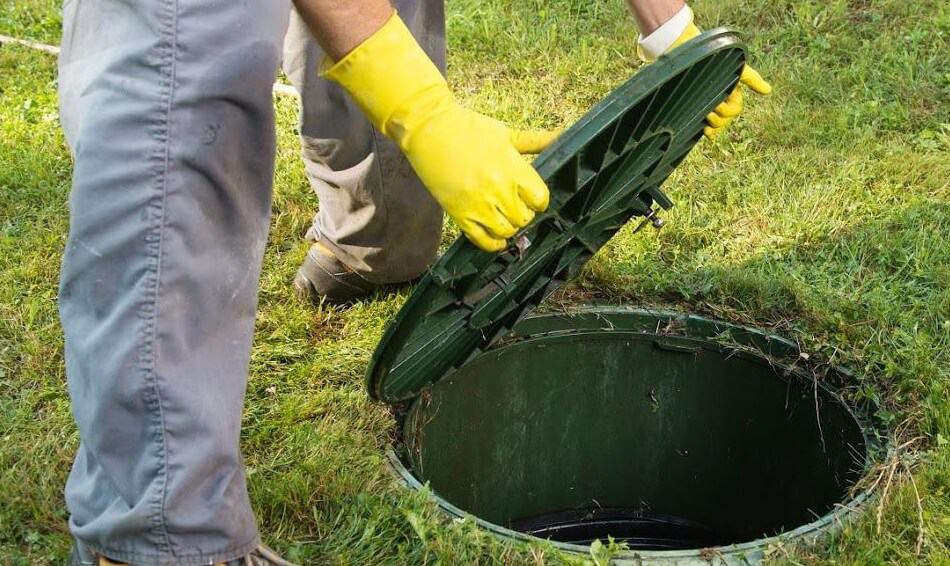How many times that weird siren-like noise has disturbed your sleep in the middle of the night from your septic alarm?
If it is a frequent event, this simply means your septic alarm is going off.
No matter how much money you’ve spent on buying a decent septic alarm, they aren’t completely prone to problems.
Improper maintenance and usage and letting the alarm cause issues that can create serious problems if not handled on time.
Septic tank systems usually have a warning system in place to alert the homeowner when something is wrong.

The alarm sounds when the water level in the pump tank becomes too high or, in some cases, too low.
The majority of alarms emit red light and a tone. When the alarm is turned off, only the red light is visible.
A septic tank alarm is a device that monitors the water level in the tank and alerts you when it is significantly higher or lower than it should be.
A triggered alarm may or may not indicate a problem with the septic tank pump.
You must install a timer in all pumped sewage systems to control when the pump can pump wastewater into the outflow field.
This function keeps the sewage field from becoming overloaded during periods of high-water consumption.
Every problem is trapped around some serious causes that you must detect before moving ahead to look for it troubleshoot.
Detecting the right causes behind any problem will help you eliminate the problem easier than ever. It can also save the bulks that you’ve previously spent on professional help.
Today in this guide, we’ve talked about the reasons behind the issue and what to do when the septic alarm goes off.
Mechanism of work
Set a timer if you have a septic tank with a pump. This timer regulates the amount of time the wastewater is pumped into the outlet field.
This keeps the drainage field from becoming overloaded during periods of high-water consumption. Timers regulate the pump’s operation by turning it on and off at predetermined intervals.
There is too much water in the system between pump cycles, and it can only go to the pump tank.
This raises the water level in the pump tank until the control unit can be turned back on and started.
Because septic tank alarms are set to sound when a certain level is reached, you can tell if there is a problem right away because a beep is heard.
Check if your Aerobic Septic System Air Pump Not Running
What to do when Septic Alarm Goes Off: Explained
One of the most important things you can do to keep your septic tank alarm from going off is to keep it in good working order.
This factor means that there are no impediments. If you discover a blockage, use a septic tank chemical drain opener or a plumbing hose to clear it.
If the blockage is severe, you must consult a professional to ensure that it is removed.
Clogs can cause long-term damage to your pump tank. You need to know how old your septic tank is. A septic tank has an average lifespan of 10 to 15 years.
When your tank reaches the end of its 15-year life cycle, you should consider installing a new septic tank. If your septic tank is over ten years old, you should start saving for a new pump tank within the next five years.
Another good idea is to have your septic tank professionally inspected at least once a year to ensure that you do not have a problem with your pump tank.

You can inspect the tank to ensure that there are no issues. They will also inspect the alarm to ensure fully operational and powered.
Call the original plumber right away if your septic alarm goes off and you’re not sure what to do.
It is best not to ignore your septic system alarm because it could indicate a major problem.
Reasons and Troubleshoot Behind Septic Alarm Goes Off
Power issue
It’s possible that someone just turned off the power switch. Check to see if the pump is turned on. A separate source can power the alarm.
Electricity is used to power pumps. If there is a power outage or other problem, your pump will be unable to remove water from the tank.
Check the main septic system switch to see if your septic system is receiving power. Remember to check the pump switch in your electrical box if you have one.
It might also work. That was actually my issue. The electrician who installed it turned it off and never turned it back on during the first two weeks we lived in our house.
That’s why the alarm went off when the tank’s water level became too high. Check the sockets to which the pump is connected as well.
If you suspect a power outage but cannot resolve it on your own, contact an electrician. If the electricity works but the pump does not, there is a problem.
Overuse of water
Do you have visitors in your home who increase your water consumption? Perhaps you’re especially preoccupied with laundry or dishes after a big event?
These could be the causes of the alarm, especially if you have properly maintained the system. Your septic system has a set capacity, and the pump is set to extract water based on that capacity.
Rising water levels can be a serious issue, so proper system maintenance is critical. If everything works properly, you can be confident that the alarm will alert you to a potential problem.
The alarm normally sounds when the water level is too high, but it can also sound when it is too low. If the pump does not have any water to pump out, it may be damaged.
The level may rise if you use a lot more water than usual. Excessive washing, frequent showers when you have guests, or even a large number of dishes can all increase the water level.

The same is true for excessive cleaning requiring a large amount of water. You know how much water you use regularly and can easily pinpoint this as the cause of the alarm going off.
Fortunately, you should resolve this problem when you return to normal use.
Clogged filter
The wastewater filter should be cleaned regularly, preferably twice a year. The filter is a screen barrier that reduces the amount of solid material entering the sewage field from the tank, which is a high system in my case. The filter is located on the tank’s drain port.
Solid dirt can clog the filter and slow the flow of water. The excess water remains in the tank for a longer period than it should, new water is added, and the level rises.
If there is no obvious cause for the increased water level, the filter is usually blamed. Clean it as soon as possible, reduce water consumption, and observe the results after a few pump cycles.
Worn out pump
Some sewage treatment plants, including mine, use submersible pumps with floats to control the pump after the timer has expired. When the water level reaches a certain point, the swimmer detects it and activates a pump.
The float will temporarily override the timer until the tank’s wastewater levels are normal. If the float breaks, you cannot control the pump, and the water level rises.
The same is true for a faulty pump. If the pump fails or runs at a reduced capacity, the water level will rise.
Pump maintenance is critical to ensuring the system’s efficiency. You can solve the problem quickly and easily by following the steps outlined below.
- Find the control panel.
- Set the toggle switch to manual mode.
- The float is faulty if the pump starts, but the water level drops.
- If the pump does not start, the issue is likely with the pump itself.
Heavy rain
Groundwater seeps into your sewer system as a result of heavy rain.
At high tide, your alarm may sound. Your tank may be full due to inclement weather. Flooding or heavy rains will soak the ground around the tank.
Standing water around the tank, especially if cracked, can potentially find its way in. A heavy downpour can also flood the ground around the sewage field, preventing water from draining from your septic tank.
The first step in this situation is to reduce your water consumption and wait until the soil dries and the pump removes excess water in subsequent cycles.
If it does not work, you can consult with a professional.
If you have little bit DIY experience then you check How To Keep Rain Water Out Of Septic Tank
Conclusion
If, after applying all the troubleshooting techniques, the problem is still poking, you must consider removing the faulty parts or improving your septic alarm.
Usually, the actual cause in the majority of the cases is disturbing water consumption.
We hope you are content after grabbing all the troubleshooting, focusing on what to do when the septic alarm goes off.



